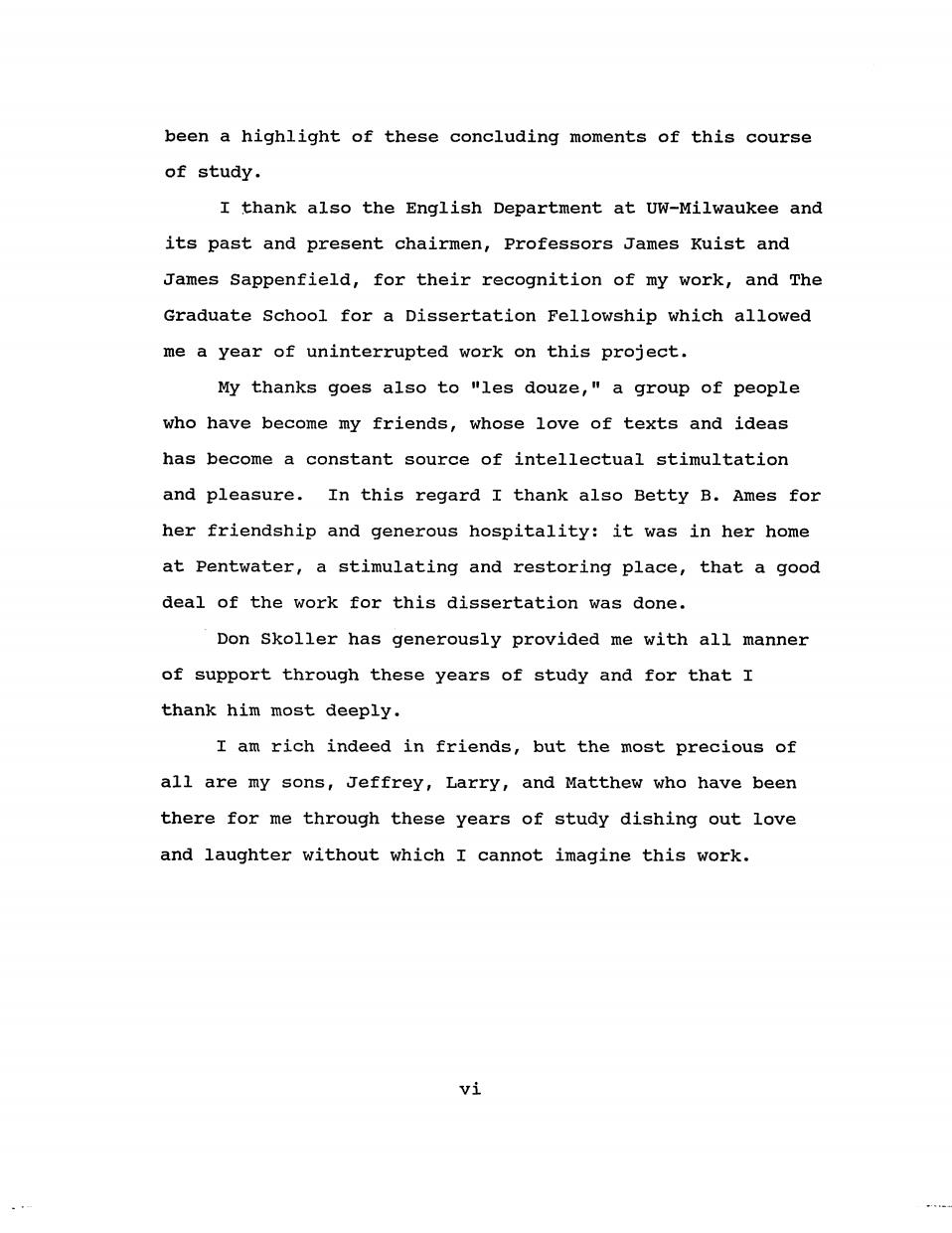
been a highlight of these concluding moments of this course of study. I thank also the English Department at UW-Milwaukee and its past and present chairmen,Professors James Kuist and James Sappenfield,for their recognition of my work,and The Graduate School for a Dissertation Fellowship which allowed me a year of uninterrupted work on this project. My thanks goes also to "les douze,"a group of people who have become my friends,whose love of texts and ideas has become a constant source of intellectual stimultation and pleasure.In this regard I thank also Betty B.Ames for her friendship and generous hospitality:it was in her home at Pentwater,a stimulating and restoring place,that a good deal of the work for this dissertation was done. Don Skoller has generously provided me with all manner of support through these years of study and for that I thank him most deeply. I am rich indeed in friends,but the most precious of all are my sons,Jeffrey,Larry,and Matthew who have been there for me through these years of study dishing out love and laughter without which I cannot imagine this work. vi
been a highlight of these concluding moments of this course of study. I thank also the English Department at UW-Milwaukee and its past and present chairmen, Professors James Kuist and James Sappenfield, for their recognition of my work, and The Graduate School for a Dissertation Fellowship which allowed me a year of uninterrupted work on this project. My thanks goes also to "les douze," a group of people who have become my friends, whose love of texts and ideas has become a constant source of intellectual stimultation and pleasure. In this regard I thank also Betty B. Ames for her friendship and generous hospitality: it was in her home at Pentwater, a stimulating and restoring place, that a good deal of the work for this dissertation was done. Don Skoller has generously provided me with all manner of support through these years of study and for that I thank him most deeply. I am rich indeed in friends, but the most precious of all are my sons, Jeffrey, Larry, and Matthew who have been there for me through these years of study dishing out love and laughter without which I cannot imagine this work. vi
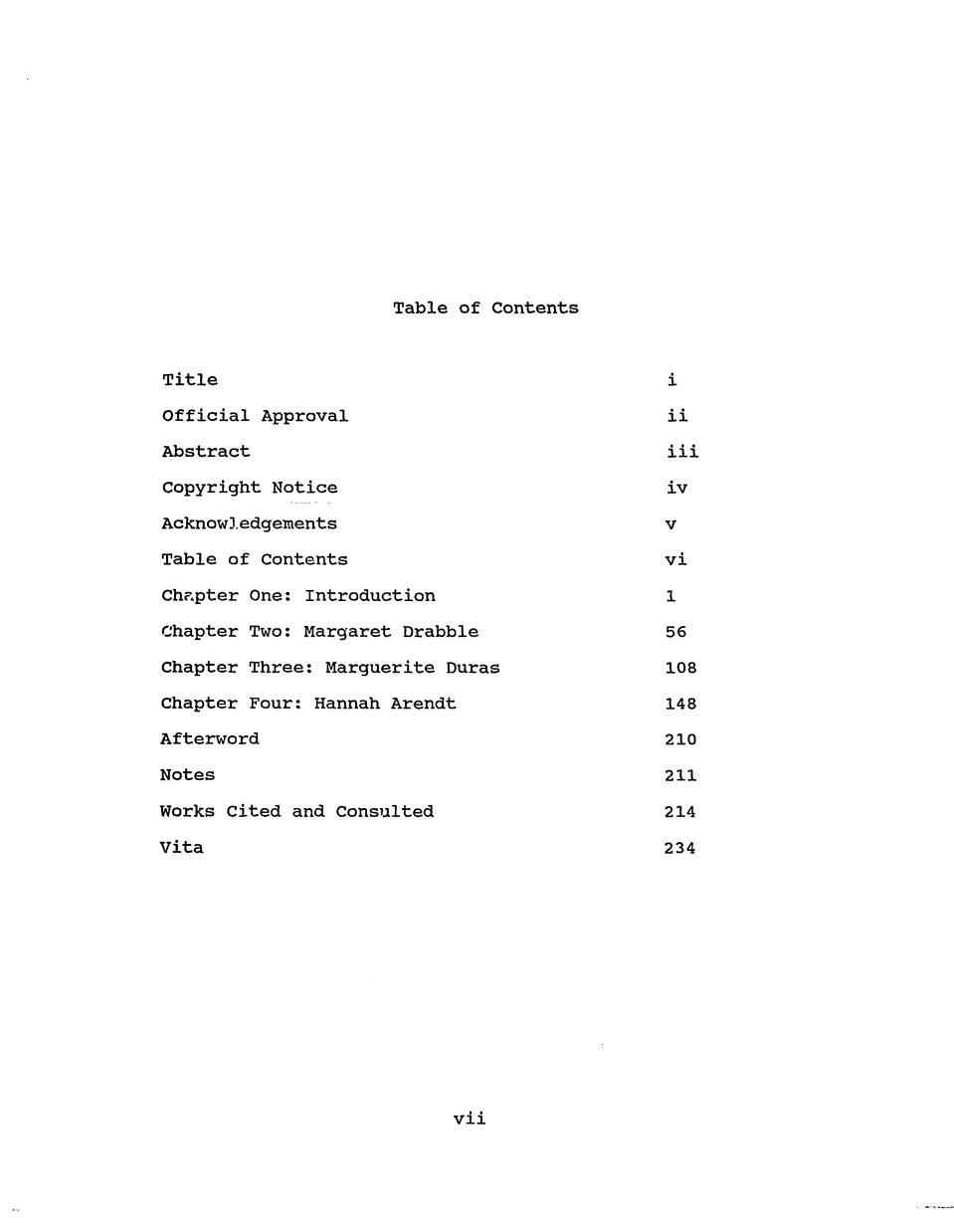
Table of Contents Title i official Approval ii Abstract iii Copyright Notice iv Acknow].edgements Table of Contents vi Chapter One:Introduction 1 Chapter Two:Margaret Drabble 56 Chapter Three:Marguerite Duras 108 Chapter Four:Hannah Arendt 148 Afterword 210 Notes 211 Works cited and Consulted 214 Vita 234 vii
Table of Contents Title i Official Approval ii Abstract iii Copyright Notice iv Acknowledgements V Table of Contents vi Chapter One: Introduction 1 Chapter Two: Margaret Drabble 56 Chapter Three: Marguerite Duras 108 Chapter Four: Hannah Arendt 148 Afterword 210 Notes 211 Works Cited and Consulted 214 Vita 234 vii
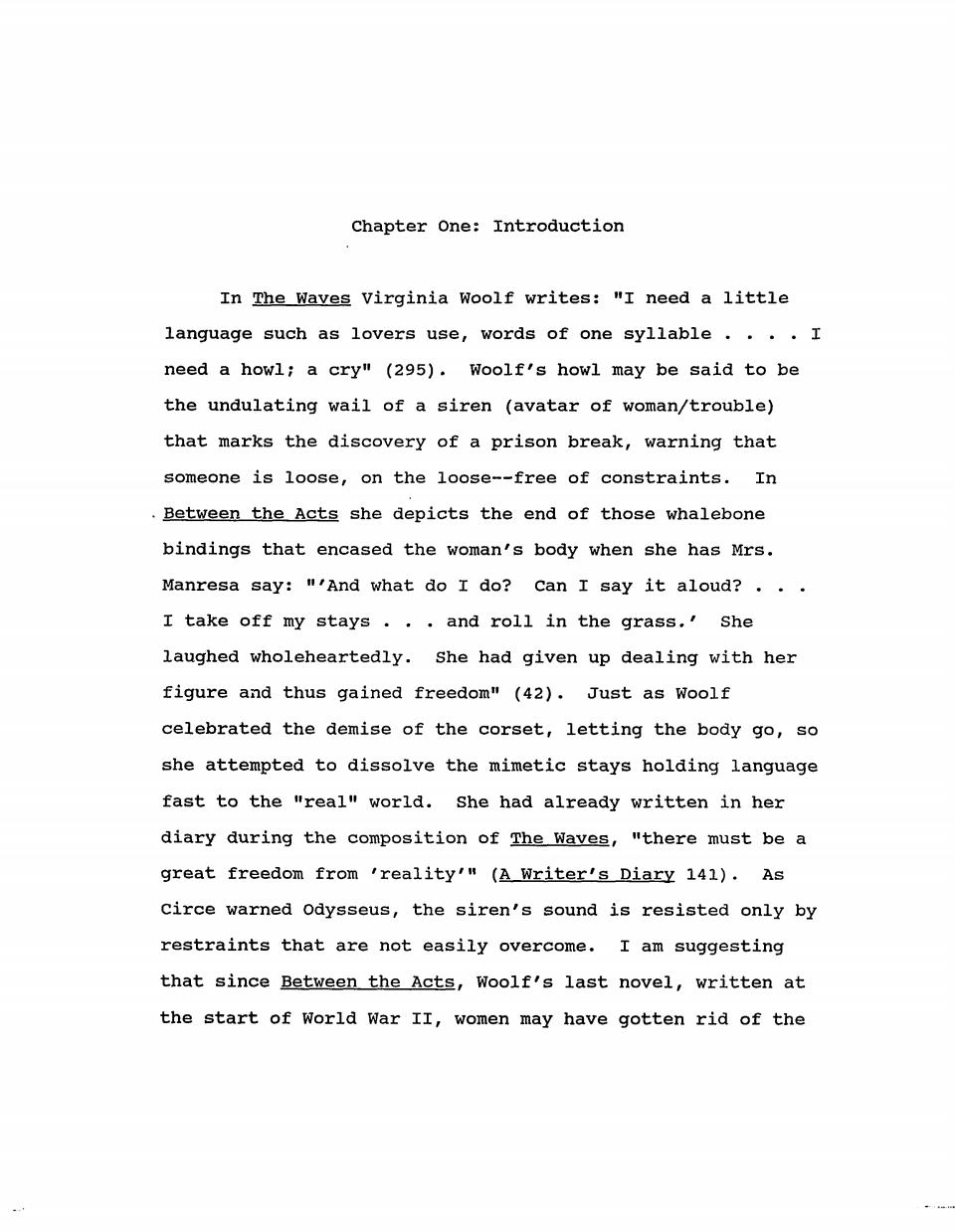
Chapter one:Introduction In The Waves virginia Woolf writes:"I need a little 1 anguage such as1 overs use,words of one syllab1e····I need a howl;a cry"(295).Woolf's howl may be said to be the undulating wail of a siren (avatar of woman/trouble) that marks the discovery of a prison break,warning that someone is loose,on the loose--free of constraints.In Between the Acts she depicts the end of those whalebone bindings that encased the woman's body when she has Mrs. Manresa say:"And what do I do?Can I say it aloud?... I take off my stays...and roll in the grass.She laughed wholeheartedly.She had given up dealing with her figure and thus gained freedom"(42).Just as Woolf celebrated the demise of the corset,letting the body go,so she attempted to dissolve the mimetic stays holding language fast to the "real"world.She had already written in her diary during the composition of The Waves,"there must be a great freedom from 'reality"(A Writer's Diary 141).As circe warned odysseus,the siren's sound is resisted only by restraints that are not easily overcome.I am suggesting that since Between the Acts,Woolf's last novel,written at the start of World War II,women may have gotten rid of the
Chapter One: Introduction In The Waves Virginia Woolf writes: "I need a little language such as lovers use, words of one syllable .... I need a howl; a cry" (295). Woolf's howl may be said to be the undulating wail of a siren (avatar of woman/trouble) that marks the discovery of a prison break, warning that someone is loose, on the loose—free of constraints. In Between the Acts she depicts the end of those whalebone bindings that encased the woman's body when she has Mrs. Manresa say: '"And what do I do? Can I say it aloud? . . . I take off my stays . . . and roll in the grass.' She laughed wholeheartedly. She had given up dealing with her figure and thus gained freedom" (42). Just as Woolf celebrated the demise of the corset, letting the body go, so she attempted to dissolve the mimetic stays holding language fast to the "real" world. She had already written in her diary during the composition of The Waves, "there must be a great freedom from 'reality'" (A Writer's Diary 141). As Circe warned Odysseus, the siren's sound is resisted only by restraints that are not easily overcome. I am suggesting that since Between the Acts. Woolf's last novel, written at the start of World War II, women may have gotten rid of the
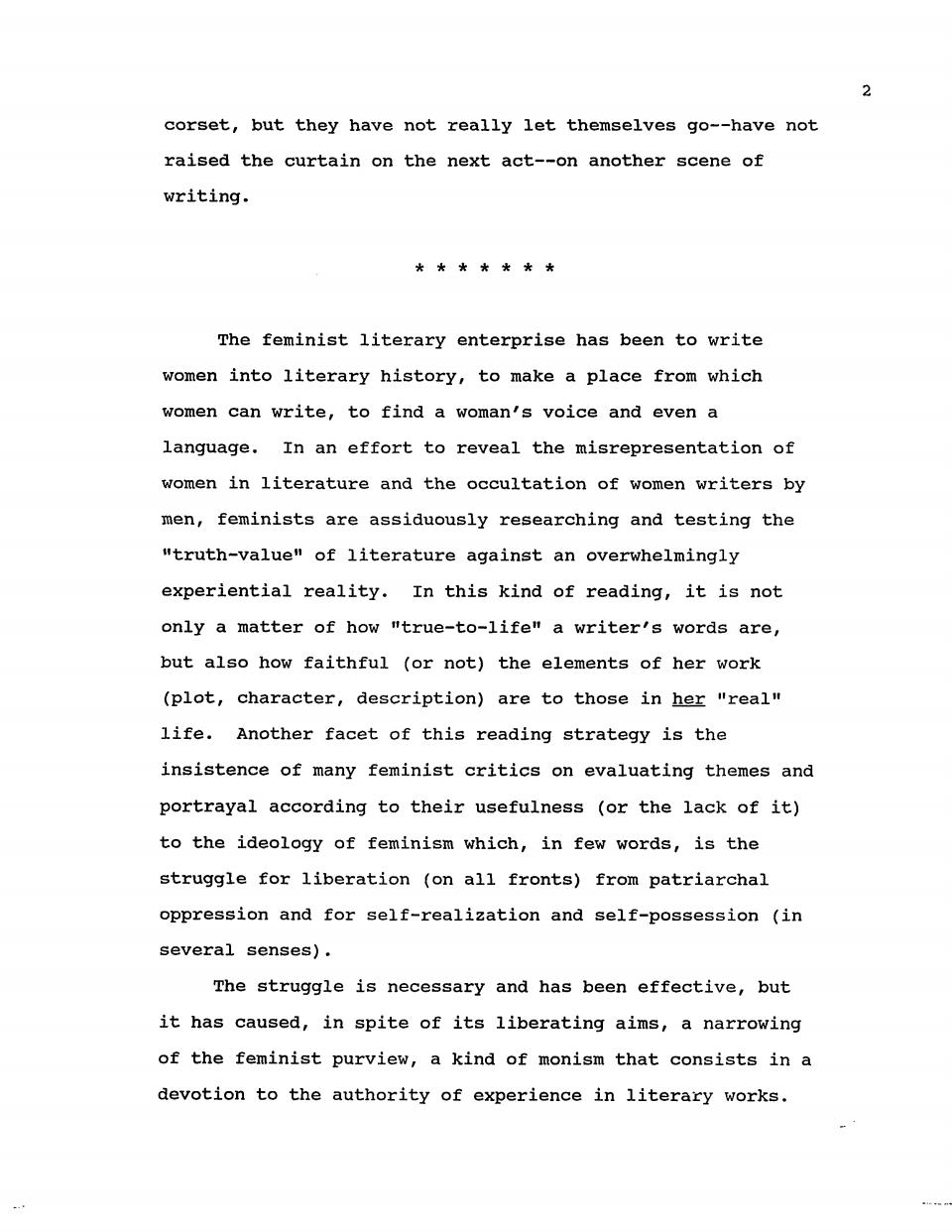
2 corset,but they have not really let themselves go--have not raised the curtain on the next act--on another scene of writing. 光★★★光★★ The feminist literary enterprise has been to write women into literary history,to make a place from which women can write,to find a woman's voice and even a language.In an effort to reveal the misrepresentation of women in literature and the occultation of women writers by men,feminists are assiduously researching and testing the "truth-value"of literature against an overwhelmingly experiential reality.In this kind of reading,it is not only a matter of how "true-to-life"a writer's words are, but also how faithful (or not)the elements of her work (plot,character,description)are to those in her "real" life.Another facet of this reading strategy is the insistence of many feminist critics on evaluating themes and portrayal according to their usefulness (or the lack of it) to the ideology of feminism which,in few words,is the struggle for liberation (on all fronts)from patriarchal oppression and for self-realization and self-possession (in several senses). The struggle is necessary and has been effective,but it has caused,in spite of its liberating aims,a narrowing of the feminist purview,a kind of monism that consists in a devotion to the authority of experience in literary works
corset, but they have not really let themselves go—have not raised the curtain on the next act—on another scene of writing. ******* The feminist literary enterprise has been to write women into literary history, to make a place from which women can write, to find a woman's voice and even a language. In an effort to reveal the misrepresentation of women in literature and the occultation of women writers by men, feminists are assiduously researching and testing the "truth-value" of literature against an overwhelmingly experiential reality. In this kind of reading, it is not only a matter of how "true-to-life" a writer's words are, but also how faithful (or not) the elements of her work (plot, character, description) are to those in her "real" life. Another facet of this reading strategy is the insistence of many feminist critics on evaluating themes and portrayal according to their usefulness (or the lack of it) to the ideology of feminism which, in few words, is the struggle for liberation (on all fronts) from patriarchal oppression and for self-realization and self-possession (in several senses). The struggle is necessary and has been effective, but it has caused, in spite of its liberating aims, a narrowing of the feminist purview, a kind of monism that consists in a devotion to the authority of experience in literary works
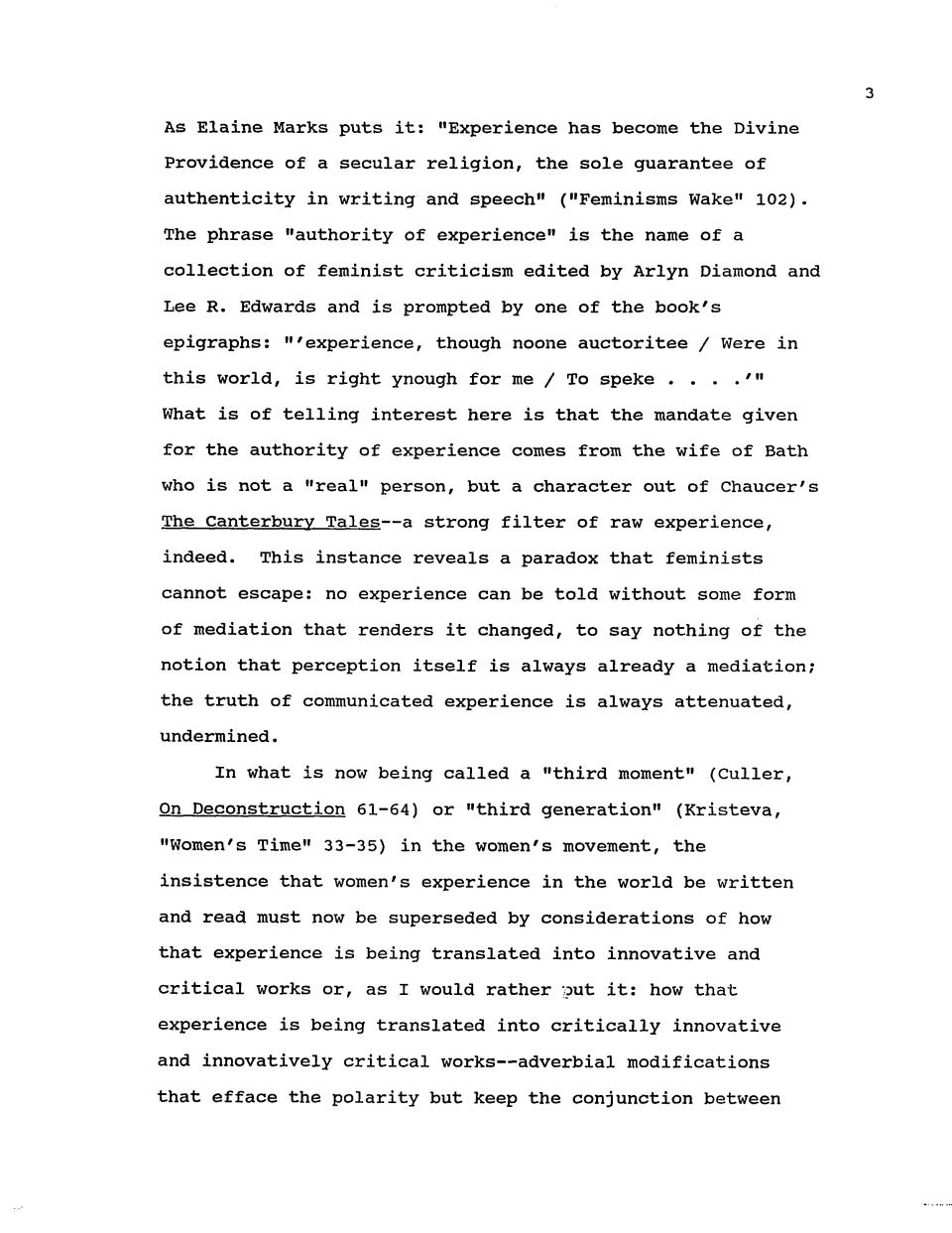
As Elaine Marks puts it:"Experience has become the Divine Providence of a secular religion,the sole guarantee of authenticity in writing and speech"("Feminisms Wake"102). The phrase "authority of experience"is the name of a collection of feminist criticism edited by Arlyn Diamond and Lee R.Edwards and is prompted by one of the book's epigraphs:"experience,though noone auctoritee Were in this world,is right ynough for me /To speke ... What is of telling interest here is that the mandate given for the authority of experience comes from the wife of Bath who is not a "real"person,but a character out of Chaucer's The Canterbury Tales--a strong filter of raw experience, indeed.This instance reveals a paradox that feminists cannot escape:no experience can be told without some form of mediation that renders it changed,to say nothing of the notion that perception itself is always already a mediation; the truth of communicated experience is always attenuated, undermined. In what is now being called a "third moment"(Culler, On Deconstruction 61-64)or "third generation"(Kristeva, "Women's Time"33-35)in the women's movement,the insistence that women's experience in the world be written and read must now be superseded by considerations of how that experience is being translated into innovative and critical works or,as I would rather put it:how that experience is being translated into critically innovative and innovatively critical works--adverbial modifications that efface the polarity but keep the conjunction between
3 As Elaine Marks puts it: "Experience has become the Divine Providence of a secular religion, the sole guarantee of authenticity in writing and speech" ("Feminisms Wake" 102). The phrase "authority of experience" is the name of a collection of feminist criticism edited by Arlyn Diamond and Lee R. Edwards and is prompted by one of the book's epigraphs: '"experience, though noone auctoritee / Were in this world, is right ynough for me / To speke . . . .'" What is of telling interest here is that the mandate given for the authority of experience comes from the wife of Bath who is not a "real" person, but a character out of Chaucer's The Canterbury Tales—a strong filter of raw experience, indeed. This instance reveals a paradox that feminists cannot escape: no experience can be told without some form of mediation that renders it changed, to say nothing of the notion that perception itself is always already a mediation; the truth of communicated experience is always attenuated, undermined. In what is now being called a "third moment" (Culler, On Deconstruction 61-64) or "third generation" (Kristeva, "Women's Time" 33-35) in the women's movement, the insistence that women's experience in the world be written and read must now be superseded by considerations of how that experience is being translated into innovative and critical works or, as I would rather put it: how that experience is being translated into critically innovative and innovatively critical works—adverbial modifications that efface the polarity but keep the conjunction between